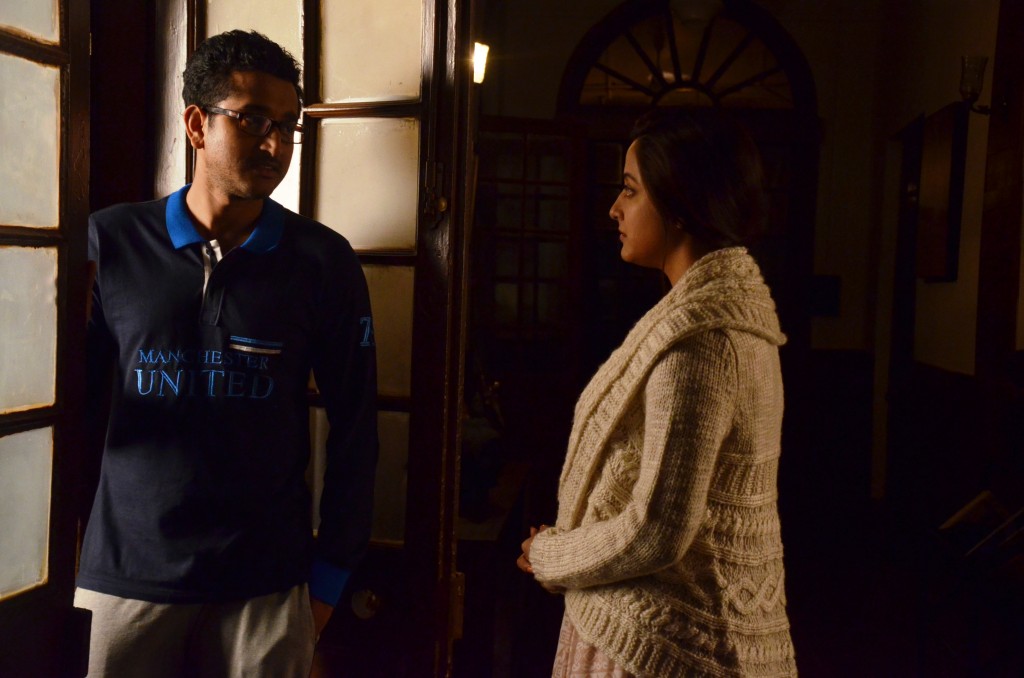Cinema is often defined as the willful suspension of disbelief. Kaushik takes off from this simple saying and takes his characters, the plot and consequently, the audience on a journey that enhances and enlarges the critical point between belief and disbelief.
Bastushaap revolves around the lives of Arjun (Abir Chatterjee), his wife Bonya (Raima Sen) and Arjun’s elder sister Antara (Churni Ganguly). Arjun runs a heritage hotel and the family is very affluent. What they lack is the happiness that comes of co-existence and sharing and love. Two Vaastu experts, Kushal (Parambrato Chatterjee) and Timir (Kaushik Ganguly) enter their lives appointed by an old family friend (Ardhendu Banerjee) of Arjun’s father to try and apply Vaastu principles and bring peace and happiness back.
Vaastu and Feng Shui are mere agencies that offer a peep into the lives of these three characters and the two Vaastu experts who unwittingly get sucked into the vicious circle of unhappiness. This is a character-driven story where the incidents emerge out of the characters. The lives of the three have metamorphosed from contentment to tragedy in a few seconds when a car crash took the lives of Antara’s husband and son and left Arjun incapacitated, extremely frustrating for a soldier noted for his sharp-shooting talents in the Rajputana Rifles. Bonya who was in another vehicle, is physically unhurt but mentally devastated and stripped of all happiness for good. Does Vaastu help these three sad people? Or do they remain in the same groove of tragedy since the accident? The open end repeats the constant vacillation between belief and disbelief not only in Vaastu and all that it stands for but also the impermanence of human relationships that, as the story unfolds, is not resolved.
Trust Kaushik Ganguly to hit on unique subject areas not traversed before in Bengali cinema and Bastusahap is no exception. Vaastu and/or Feng Shui is the foundation stone on which the story is built but other than that large image of the Laughing Budda or, a quartz crystal ball held in a beautifully carved wooden box, or, wind chimes hung in a specific location, or, a small potted bamboo plant, the film does not explore the impact of Vaastu on the lives of the characters, Bastushaap explores the changing dynamics of the relationships between and among the five characters in the story. Antara, who is constantly veering between sanity and the lack of it, is the only person who resolves her problem and with her exit the lives of Arjun, Bonya and their son, it is hoped, will resolve naturally.
Acting forms the high point with Abir as Arjun getting top marks as a strong, macho character with sharp, negative shades who uses his guilt for the accident as an excuse to refrain from any kind of communication with his beautiful wife including sex. Or, maybe, he has lost his manhood in the accdent either psychologically or physically, who knows? Both Parambrato and Kaushik are also naturals in expressing their confusion as respective pasts that continue to haunt them. Raima expresses her unhappiness mainly with her eyes and does an eloquent job with her silences. Churni takes up the most challenging role in the film with great artistry.
The flashbacks in the precincts of a Kolkata hospital intercutting with the present in Darjeeling could have done with some sharp editing. Secondly, the flashback is a sharply etched throwback to another powerful film Anubrato Bhalo Accho (2015) which dealt exclusively with a bonding that grows between the respective spouses of couples where the partner is critically ill. The man losing his wife was also present in the other film. The “sudden death” incident of the targeting bet introduced to reveal (a) Timir’s dark past and (b) Kushal having fallen in love with the unhappy Bonya drags on for too long and could have been trimmed down too. Besides, it detracts from the main argument for and against Vastu.
The tiny detailing showing Antara knitting the same little sweater for Bonya’s son everyday and unspooling the knitting soon after is an imaginative touch. The single kissing scene backed with a beautiful song adds value to the aesthetics and relationshp dynamics of the film. The music by Indraadip Dasgupta is restrained, low-key and subtle that suits the dark mood of the film and the lyrics are significant and telling. The location offers dream-like visuals brought to reality by the craft of Gopi Bhagat as he also captures the superimposed scenes in the target bottles that take him to flashes from his past but the editing needed to be worked on to make the film more tight-knit. The one logical lapse that keeps bogging this critic is – how, why and where on earth did Bonya acquire the last painting by Shahana did before she fell ill and forgot to sign?
Bastushaap is a good and well-crafted film with an original subject line but with some crisp cutting, it would have certainly been a better one.
Bengali, Drama, Color


